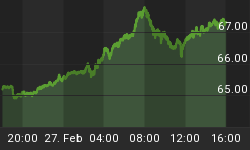The headlines on today's flash estimate for Euro-zone Q3 GDP growth focused on the fact that the pace of expansion slowed from Q2, prompting a wave of gloom in the equity markets and conjecture that the interest rate hike expected from the European Central Bank (ECB) in December may be the last of this cycle. However, Q3 growth was still pretty impressive, expanding by 0.5% on the quarter and 2.6% on the year. Just as important, the numbers for Germany for the first half of this year have been revised upward. All told, there was nothing in today's release to suggest that the ECB will rethink its main scenario of healthy growth heading into 2007.

Further details on the Euro-zone Q3 GDP will be released November 30. For now, it appears that Germany, the largest of the twelve economies, saw a 0.6% quarter-on-quarter expansion, taking the year-over-year rate to 2.3%. And, quarterly growth for Q2 was revised upward from 0.9% to a six-year-high of 1.1%, while Q1 was revised upward from 0.7% to 0.8%. Today's preliminary data suggest that July-September growth was powered by exports and by rising private consumption and investment. This reinforces the view that Germany's export-led recovery of the past two years has broadened and deepened. While private consumption is likely to slip in the early months of 2007 - thanks to the now-infamous three percentage point VAT tax rate hike that takes effect in January - and some easing in foreign demand is likely to mean somewhat slower export growth, we continue to feel that Germany's economy will surprise on the upside next year.

Today also saw the release of the German ZEW think tank's November expectations indicator, which dropped yet again. The investor sentiment index - based on a survey of analysts and institutional investors - fell for the tenth straight month, hitting a thirteen-year low of -28.5, down from -27.4 in October. However, as we've argued before (see Daily Global Commentary, October 17: Germany's Investors Are Gloomy But Outlook Is Far More Sanguine), all the ZEW index tells us is that the financial establishment is worried about the impact of that VAT hike. As a leading indicator of economic growth it doesn't tell us anything.
The Euro-zone's second largest economy, France, apparently stalled in Q3, as real GDP growth dropped from 1.2% quarter-over-quarter in April-June to zero in Q3. While the data could yet be revised upward a tad, France is starting to look like the drag on the Euro-zone.

The third largest economy, Italy, managed to turn in 0.3% growth last quarter. And in fourth place, Spain's quarterly growth rate once again came in at an impressive 0.9%, taking the annual rate up to a five-year high of 3.8%. At this rate, it won't be long before Spain overtakes Italy as the third-largest economy.

As we've noted before (most recently, Daily Global Commentary, November 2: Trichet Points To December 7 Rate Hike; Hawkish Tone Suggests More To Come In 2007), the ECB is firmly focused on the medium-term inflation outlook, and in particular on the rate of money and credit expansion. After the November 2 interest rate meeting, Governor Trichet hedged his bets somewhat for 2007 - between the German VAT hike, slowing demand from the US, and gyrating oil prices, the outlook is nothing if not uncertain - but overall seemed to expect that the refi rate will not be topping out at 3.50%. There is nothing in today's flash estimate on Q3 GDP to change this view.
For the remainder of this month, Euro-zone dates to watch include our two favorite leading indicators on the 23rd, the German Ifo and the Belgian business indicator; Euro-zone money supply data on the 28th; and sentiment indicators and flash November inflation data on the 30th.















